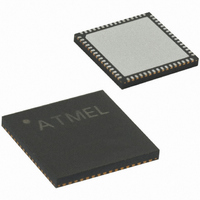AT91SAM7S256C-MU Atmel, AT91SAM7S256C-MU Datasheet - Page 100

AT91SAM7S256C-MU
Manufacturer Part Number
AT91SAM7S256C-MU
Description
IC ARM7 MCU 32BIT 256K 64-QFN
Manufacturer
Atmel
Series
AT91SAMr
Datasheets
1.AT91SAM7S16-MU.pdf
(51 pages)
2.AT91SAM7S16-MU.pdf
(779 pages)
3.AT91SAM7S256C-MU.pdf
(2 pages)
Specifications of AT91SAM7S256C-MU
Core Processor
ARM7
Core Size
16/32-Bit
Speed
55MHz
Connectivity
I²C, SPI, SSC, UART/USART, USB
Peripherals
Brown-out Detect/Reset, DMA, POR, PWM, WDT
Number Of I /o
32
Program Memory Size
256KB (256K x 8)
Program Memory Type
FLASH
Ram Size
64K x 8
Voltage - Supply (vcc/vdd)
1.65 V ~ 1.95 V
Data Converters
A/D 8x10b
Oscillator Type
Internal
Operating Temperature
-40°C ~ 85°C
Package / Case
64-VQFN Exposed Pad, 64-HVQFN, 64-SQFN, 64-DHVQFN
Processor Series
AT91
Core
ARM7TDMI
Data Bus Width
32 bit
Data Ram Size
64 KB
Interface Type
SPI, TWI, USART, USB
Maximum Clock Frequency
55 MHz
Number Of Programmable I/os
32
Number Of Timers
5
Operating Supply Voltage
3.3 V
Maximum Operating Temperature
+ 85 C
Mounting Style
SMD/SMT
Minimum Operating Temperature
- 40 C
Operating Temperature Range
- 40 C to + 85 C
For Use With
AT91SAM-ICE - EMULATOR FOR AT91 ARM7/ARM9AT91SAM7S-EK - KIT EVAL FOR ARM AT91SAM7S
Lead Free Status / RoHS Status
Lead free / RoHS Compliant
Eeprom Size
-
Lead Free Status / Rohs Status
Details
Other names
AT91SAM7S256-MU
AT91SAM7S256-MU
AT91SAM7S256-MU
Available stocks
Company
Part Number
Manufacturer
Quantity
Price
Part Number:
AT91SAM7S256C-MU
Manufacturer:
ATMEL/爱特梅尔
Quantity:
20 000
- Current page: 100 of 779
- Download datasheet (11Mb)
18.3.4
18.3.5
18.3.6
100
AT91SAM7S Series Preliminary
Abort Status
Embedded Flash Controller
Misalignment Detector
There are three reasons for an abort to occur:
When an abort occurs, a signal is sent back to all the masters, regardless of which one has gen-
erated the access. However, only the ARM7TDMI can take an abort signal into account, and
only under the condition that it was generating an access. The Peripheral DMA Controller does
not handle the abort input signal. Note that the connection is not represented in
To facilitate debug or for fault analysis by an operating system, the Memory Controller integrates
an Abort Status register set.
The full 32-bit wide abort address is saved in MC_AASR. Parameters of the access are saved in
MC_ASR and include:
In the case of a Data Abort from the processor, the address of the data access is stored. This is
useful, as searching for which address generated the abort would require disassembling the
instructions and full knowledge of the processor context.
In the case of a Prefetch Abort, the address may have changed, as the prefetch abort is pipe-
lined in the ARM processor. The ARM processor takes the prefetch abort into account only if the
read instruction is executed and it is probable that several aborts have occurred during this time.
Thus, in this case, it is preferable to use the content of the Abort Link register of the ARM
processor.
The Embedded Flash Controller is added to the Memory Controller and ensures the interface of
the Flash block with the 32-bit internal bus. It increases performance in Thumb Mode for Code
Fetch with its system of 32-bit buffers. It also manages with the programming, erasing, locking
and unlocking sequences thanks to a full set of commands.
The Memory Controller features a Misalignment Detector that checks the consistency of the
accesses.
For each access, regardless of the master, the size of the access and the bits 0 and 1 of the
address bus are checked. If the type of access is a word (32-bit) and the bits 0 and 1 are not 0,
or if the type of the access is a half-word (16-bit) and the bit 0 is not 0, an abort is returned to the
master and the access is cancelled. Note that the accesses of the ARM processor when it is
fetching instructions are not checked.
The misalignments are generally due to software bugs leading to wrong pointer handling. These
bugs are particularly difficult to detect in the debug phase.
• access to an undefined address
• an access to a misaligned address.
• the size of the request (field ABTSZ)
• the type of the access, whether it is a data read or write, or a code fetch (field ABTTYP)
• whether the access is due to accessing an undefined address (bit UNDADD) or a misaligned
• the source of the access leading to the last abort (bits MST0 and MST1)
• whether or not an abort occurred for each master since the last read of the register (bit
address (bit MISADD)
SVMST0 and SVMST1) unless this information is loaded in MST bits
6175K–ATARM–30-Aug-10
Figure
18-1.
Related parts for AT91SAM7S256C-MU
Image
Part Number
Description
Manufacturer
Datasheet
Request
R

Part Number:
Description:
KIT EVAL FOR ARM AT91SAM7S
Manufacturer:
Atmel
Datasheet:

Part Number:
Description:
MCU, MPU & DSP Development Tools KICKSTART KIT ATMEL AT91SAM7S
Manufacturer:
IAR Systems

Part Number:
Description:
MCU ARM9 64K SRAM 144-LFBGA
Manufacturer:
Atmel
Datasheet:

Part Number:
Description:
IC ARM7 MCU FLASH 256K 100LQFP
Manufacturer:
Atmel
Datasheet:

Part Number:
Description:
IC ARM9 MPU 217-LFBGA
Manufacturer:
Atmel
Datasheet:

Part Number:
Description:
MCU ARM9 ULTRA LOW PWR 217-LFBGA
Manufacturer:
Atmel
Datasheet:

Part Number:
Description:
MCU ARM9 324-TFBGA
Manufacturer:
Atmel
Datasheet:

Part Number:
Description:
IC MCU ARM9 SAMPLING 217CBGA
Manufacturer:
Atmel
Datasheet:

Part Number:
Description:
IC ARM9 MCU 217-LFBGA
Manufacturer:
Atmel
Datasheet:

Part Number:
Description:
IC ARM9 MCU 208-PQFP
Manufacturer:
Atmel
Datasheet:

Part Number:
Description:
MCU ARM 512K HS FLASH 100-LQFP
Manufacturer:
Atmel
Datasheet:

Part Number:
Description:
MCU ARM 512K HS FLASH 100-TFBGA
Manufacturer:
Atmel
Datasheet:

Part Number:
Description:
IC ARM9 MCU 200 MHZ 324-TFBGA
Manufacturer:
Atmel
Datasheet:

Part Number:
Description:
IC ARM MCU 16BIT 128K 256BGA
Manufacturer:
Atmel
Datasheet:

Part Number:
Description:
IC ARM7 MCU 32BIT 128K 64LQFP
Manufacturer:
Atmel
Datasheet:











